Notes on Simple Made Easy
Table of contents
These are my notes on the talks “Simple Made Easy” by Rich Hickey.
Simplicity is a prerequisite for reliability - Dijkstra
Simple:
- One role.
- One task.
- One concept.
- One dimension.
- Lack of interleaving. (Does not mean there’s only one thing)
Easy:
- “Near”. To our understanding, skill/set or capabilities.
- Easy is relative.
We can only make reliable those things we can understand.
We can only consider a few things at a time. If a piece is intertwined with another we already have to keep both in mind. It’s combinatorial.
Complexity undermines understanding.
Ignoring complexity slows you in the long haul.

The simple route is slower at the beginning because it requires thought.
Benefits of simplicity:
- Ease of understanding.
- Ease of change
- Ease of debugging
- Flexibility
- Policy
- Location
Complect = interleave, entwine, braid.
Compose = place together.
Modularity != simplicity. Partition and stratification (modularity) != simplicity.
Modularity = simplicity; when we limit what those modules are allowed to think about.
Programming, when stripped of all its circumstantial irrelevancies, boils down to no more and no less than very effective thinking so as to avoid unmastered complexity, to very vigorous separation of your many different concerns - Dijkstra
Simplicity is the ultimate sophistication - Da Vinci
Simple made easy
- Chose simple constructs over complexity-generating constructs.
- It’s the artifacts, not the authoring.
- Create abstractions with simplicity as a basis.
- Simplify the problem space before you start.
- Simplicity often means making more things, not fewer.
The simplicity toolkit
| Construct | Get via |
|---|---|
| Values | final, persistent collections… |
| Functions | stateless methods |
| Namespace | language support |
| Data | Maps, arrays, sets, JSON… |
| Polymorphism a la carte | Protocols, type classes |
| Set functions | Libraries |
| Queues | Libraries |
| Declarative manipulation | SQL, Prolog |
| Rules | Libraries, Prolog |
| Consistency | Transactions, values… |
![rand[om]](/img/bike_m.png)